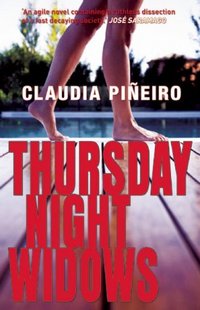First published in Spanish as Las viudas de los jueves 2005
Winner of the Clarin Award (Argentina) 2005
English translation by Miranda France
ISBN 978-1-904738-41-1
274 pages
Every Thursday night Teresa Scaglia's husband and three friends got together at the Scaglia's house to have dinner, play cards, and drink. For a long time it had been traditional for the wives to go to the cinema. Teresa Scaglia arrives home to find her husband and two of his friends dead at the bottom of their pool.
The Cascade Heights Country Club is a gated community on the outskirts of Buenos Aires. It consists of five hundred acres ringed by a perimeter fence. It has a golf course, tennis courts, a swimming pool, two club houses, and its own private security. Inside its gates, carefully vetted residents live deceptively carefree lives, dependent on the high salaries earned by the male residents. The opulent life lived inside the gates, characterised by non-working wives, rounds of social and dinner engagements, tennis and golf parties, children attending private schools, nannies, maids, and gardeners, is very different to that lived by people outside.
THURSDAY NIGHT WIDOWS opens dramatically with Ronie Guevera, who should have been next door with the other men at Scaglia's, falling down the stairs and achieving a compound fracture of his leg. Ronie has returned from Scaglia's early and it is only at the end of the novel that we fully understand why, as his wife Virginia is driving him to the hospital, he demands to be taken to El Tano Scaglia's. Virginia ignores him.
The explanation of who killed the men in the swimming pool and why, that is, the crime fiction element, seems to take a back seat to description of how this gated community has developed from the end of the 1980s to the night of the deaths in 2001. We see the development mainly from the point of view of Virginia Guevera, but occasionally through the eyes of other women and even the ambitious men.
Gated communities became a feature of the noveau riche not only in Argentina but also in USA and Australia at this time.Even today here in Australia new developments, often known as "estates", often have substantial walls but the gates are no longer being installed.
So what Claudio Pineiro gives us in THURSDAY NIGHT WIDOWS is, as the blurb on the back of the book says, "a psychological portrait of a middle class living beyond its means and struggling to conceal deadly secrets."
Dare I say that this book is not primarily crime fiction, although that is one of its elements?
Others will simply read it as "literature", for the insight it gives into Argentinian society of the time.
My rating: 4.5
Other reviews to check:
- A Work in Progress found it reminiscent of Barbara Vine: "as much a contemporary morality tale as a crime novel."
- Bitter Lemon Press
- Petrona: "a hilarious yet telling social satire, extremely readable"
- Crime Scraps: "the first, but I hope not the last, of Claudia Pineiro's novels to be available in English"
- The Game's Afoot: "a moral tale that has universal implications."
- Reactions to Reading: "as a window into a community you might never see otherwise I highly recommend it."

4 comments:
I agree it's not really crime fiction - but I did think it excellent, glad you enjoyed it
Kerrie - Thanks for this review. I enjoy books like this that give a sociological "snapshot" of a time and place. There are still plenty of gated communities in the U.S., including the part of Southern California where I live. I've always wondered about life there... Interesting theme....
I immediately checked my library's database for this book--sadly, they only have it en espanol. It sounds interesting--although, as you say, not exactly a traditional mystery.
I read this book last month and absolutely loved it. You're right -- it's not crime fiction per se, but it's still incredible. Thanks for your review!
Post a Comment